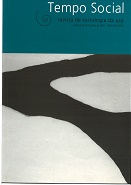Individual experience and objectivity in Minima moralia
DOI:
https://doi.org/10.1590/S0103-20702011000100008Keywords:
Theodor Adorno, Minima moralia, Dialectic of Enlightenment, Critical theoryAbstract
Written in the period between the drafting and final publication of Dialectic of Enlightenment, the 153 aphorisms of Adorno's Minima moralia can be described, like the work co-authored with Horkheimer, as an investigation into the causes that led humanity to sink "into a new kind of barbarism." However, in Minima moralia this question is examined from a highly singular perspective and methodology. Adorno proposes nothing less then the translation of individual and subjective experience into a universal and objective form of knowledge.Downloads
References
Adorno, Theodor. (2003), “O ensaio como forma”. In: . Notas de literatura I. São Paulo, Editora 34, pp. 15-45.
. (2008), Minima moralia: reflexões a partir da vida lesada. Rio de Janeiro, Azougue.
Adorno, Theodor & Horkheimer, Max. (1985), Dialética do esclarecimento: fragmentos filosóficos. Rio de Janeiro, Jorge Zahar.
Benjamin, Walter. (1987), Rua de mão única. São Paulo, Brasiliense.
Horkheimer, Max. (1983), “Teoria tradicional e teoria crítica”. In: . Textos escolhidos. São Paulo, Abril Cultural, pp. 117-154.
. (1999), “A presente situação da filosofia social e as tarefas de um Instituto de Pesquisas Sociais”. Praga – Estudos Marxistas, n. 7. São Paulo, Hucitec, pp. 121-132.
Jay, Martin. (2008), A imaginação dialética: história da Escola de Frankfurt e do Instituto de Pesquisas Sociais, 1923-1950. Rio de Janeiro, Contraponto.
Kraus, Karl. (1988), Ditos e desditos. São Paulo, Brasiliense.
Neumann, Franz. (1944), Behemoth: the structure and practice of national socialism. Nova York, Oxford University Press.
Pollock, Friedrich. (1990), “State capitalism: its possibilities and limitations”. In: Arato, Andrew & Gebhardt, Eike. The essential Frankfurt school reader. Nova York, Continuum, pp. 71-94.
Rose, Gillian. (1978), The melancholy science. London, Macmillan Press.
Wiggershaus, Rolf. (2002), A Escola de Frankfurt. Rio de Janeiro, Difel.
Downloads
Published
Issue
Section
License
Copyright (c) 2015 Tempo Social

This work is licensed under a Creative Commons Attribution-NonCommercial 4.0 International License.


